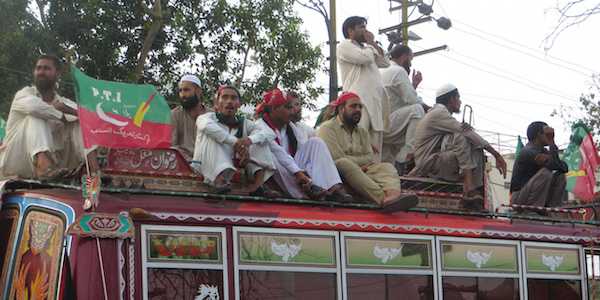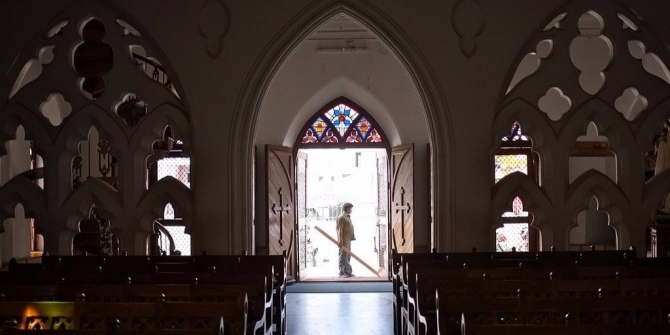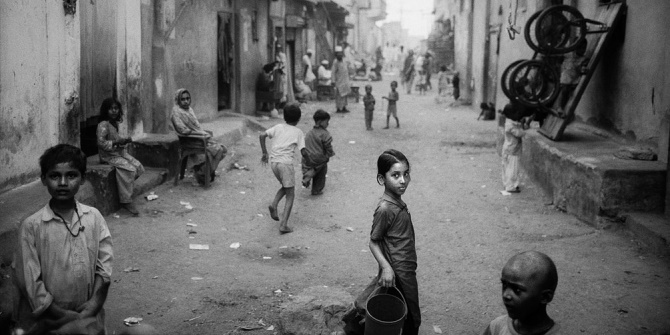 The outward perception that the newly elected Imran Khan is a military puppet is overly simplistic, failing to acknowledge the public’s backlash against the Bhutto and Sharif dynasties, writes Saloni Kapur.
The outward perception that the newly elected Imran Khan is a military puppet is overly simplistic, failing to acknowledge the public’s backlash against the Bhutto and Sharif dynasties, writes Saloni Kapur.
Imran Khan’s victory in the general elections held in Pakistan in July 2018 was met with cynicism in Western journalistic and policy circles. The New York Times reported that Khan’s “campaign was said to have been backed by the military,” and that military officials had targeted Khan’s political rivals so that his Pakistan Tehreek-e-Insaf (PTI) party “could cruise to victory.” Colin Cookman of the US Institute of Peace wrote on the War on the Rocks website that the PTI had “achieved its victory in part due to the interventions of the Pakistani military and judiciary in the months prior to the polls, which tilted the playing field in favor of Khan’s party.” An opinion piece published in the Guardian remarked that there was “significant evidence of political manipulation by the military establishment during the run-up to the election.” What these portrayals of Khan as a military stooge neglect is his charisma and popular support, as well as the context within which his party has won the election.
As I argue in my forthcoming book, Pakistan after Trump: International Society’s Role in Counterterrorism Cooperation, Khan’s emergence as a significant political force is an indicator of a shift within Pakistani society away from dynastic politics, and of a diffusion of social control that has been under way in the country since 2007. Indeed, as Maya Tudor of the Oxford University contends, the rise of the PTI, which has appealed to young, urban, educated voters, signifies the health of Pakistani democracy. Khan has attacked the corruption and elitism of the political class, as well as criticising US policy towards Pakistan. As such, his party’s victory is in line with a trend of anti-dynastic and anti-corruption sentiment in contemporary South Asia, which also characterised Indian prime minister Narendra Modi’s electoral triumph in 2014.
In the aftermath of the 11 September 2001 terrorist attacks in the United States, there has been considerable disenchantment within Pakistan over the government’s participation on the US-led “global war on terror.” Former president Pervez Musharraf faced a backlash from Islamist militant organisations after his government’s raid on the Lal Masjid, or Red Mosque, in Islamabad in 2007. Unnerved by the army’s counterterrorism operations as part of the “war on terror,” terrorist groups started to increasingly turn their ire towards the Pakistani government and security installations. Alongside this shift, lawyers and civil society activists launched an agitation over Musharraf’s suspension of chief justice Iftikhar Muhammad Chaudhry. As social actors such as civil society movements, lawyers’ associations, Islamist political parties, secular opposition parties and Islamist militant outfits began to assert themselves in national politics, Musharraf’s regime collapsed under the weight of this combined assault.

PTI supporters sit on top of a bus to get a better view of Imran Khan in Karachi. Photo credit: Wasif Malik, Flickr, CC BY 2.0.
Khan’s victory in the 2018 polls is a continuation of this shift away from a centralised power structure in favour of diffused social control that commenced in 2007-08 with Musharraf’s downfall. He is neither a Bhutto nor a Sharif, and this is significant for a country where civilian political power has alternated between these two clans throughout the 1990s and well into the twenty-first century. His consistent rhetorical challenges to corruption and dynasticism threaten the entrenchment of social control within the hands of a military and political elite class that has characterised Pakistan’s politics since the country’s birth. Commentators have treated this rhetoric with realist cynicism, but the rise of these ideals to prominence in Pakistani politics marks the culmination of an important transformation that has been taking place domestically.
The question of the military’s alleged support for the PTI is pertinent, given that Pakistan has been ruled directly by the military for a significant proportion of its history. It is highly plausible that the generals hope to exert greater influence over the country’s politics through a pliant government. However, what is significant here is not that the army is trying to pull the strings, but the fact that it has not attempted an outright coup. Given the country’s history, it is unsurprising that the military should seek to exert control over the administration. What is remarkable is that it has had to rely on an unpredictable, popular leader such as Khan—by no means the pliant, meek “puppet” being portrayed in the Indian and Western media—to do so. As Shairee Malhotra puts it, Khan’s “independent and temperamental nature might alarm the establishment.” Similarly, Husain Haqqani argues that Khan “is not the kind of man the establishment would like to be in charge. He is mercurial and unpredictable.”
Despite Khan’s unlikely credentials as a military stooge, PTI has won the election. This suggests that, as Christine Fair predicted in 2014, democracy is for now, here to stay. As a corollary to this, Khan’s victory is a democratising event that indicates that power can no longer be the closely guarded prerogative of a tiny military-political elite, but that new actors are finding their voice, and social control is being dispersed.
In conclusion, the perception that Khan is a military stooge is simplistic and overlooks the wider shifts taking place in Pakistan’s domestic power structure. Like Modi’s rise, which came in the wake of several corruption scandals implicating India’s Congress party, Khan’s ascent comes on the heels of former prime minister Nawaz Sharif’s conviction on corruption charges after the Panama Papers leak. Seen in this light, Khan’s victory could be interpreted as a victory for the ideals of accountability and democracy, and a potential sign of Pakistan’s transition from a centralised to a diffused power structure.
This article gives the views of the author, and not the position of the South Asia @ LSE blog, nor of the London School of Economics. Please read our comments policy before posting.
About the Author
 Saloni Kapur is a PhD candidate in International Relations at Lancaster University and visiting faculty at the Symbiosis School of International Studies. Her research focuses on international society’s responsibility towards insecurity in Pakistan. She tweets @MsKapur1.
Saloni Kapur is a PhD candidate in International Relations at Lancaster University and visiting faculty at the Symbiosis School of International Studies. Her research focuses on international society’s responsibility towards insecurity in Pakistan. She tweets @MsKapur1.







Excellent
Thank you!